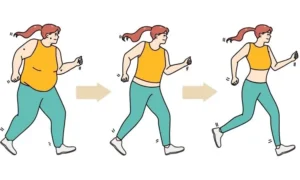How to lose weight? Why should we lose weight or gain weight? A healthy life requires a cognitively, physically and spiritually sound body. The slightest deterioration in our physical health can negatively affect the proper functioning of many organs, especially the nervous and digestive systems. Excess weight, which reduces the quality of life and can even lead to life-threatening diseases, should definitely be treated. Losing weight may not be as easy as gaining weight; the professional support of a nutritionist in this process can make the weight loss process healthier and provide permanent results. Specialist Dietician Hafize Kovancı and Assoc. Prof. Dr. Abdullah Şişik from Letsmedi Department of Nutrition and Dietetics provided information about weight loss methods.
What is weight?
The kilogram is the internationally recognised basic unit for measuring body weight. This unit, often abbreviated to “kilo”, is the most common way of expressing body weight. Body mass index (BMI) is a measure of body weight in metres divided by height in metres, which can be categorised as underweight, overweight or the ideal weight for health. A person’s age, gender and lifestyle play an important role in weight management and health.
Identify the signs of weight gain
Body Mass Index (BMI) is a reliable measure used to determine whether an individual is overweight or obese, based on the World Health Organization’s classification of obesity. It is calculated by dividing an individual’s weight (in kilograms) by the square of their height in square meters (BMI=kg/m²). BMI assesses body weight in relation to height, but does not provide information about the distribution of body fat. According to the international obesity classification of the World Health Organization, Table 1 clearly displays the classes of underweight, overweight, and obesity in adults based on BMI.
| Classification | BMI (kg/m²) |
|---|---|
| Basic Intersection Points | Enhanced Intersection Points |
| Underweight | <18.50 |
| Severe Thinness | <16.00 |
| Moderate Thinness | 16.00 – 16.99 |
| Mild Thinness | 17.00 – 18.49 |
| Normal | 18.50 – 24.99 |
| 18.50 – 22.99 | |
| 23.00 – 24.99 | |
| Overweight | >25.00 |
| Pre-obese | 25.00 – 29.99 |
| 25.00 – 27.49 | |
| 27.50 – 29.99 | |
| Obese | >30.00 |
| Obese Class I | 30.00 – 34.99 |
| 30.00 – 32.49 | |
| 32.50 – 34.99 | |
| Obese Class II | 35.00 – 39.99 |
| 35.00 – 37.49 | |
| 37.50 – 39.99 | |
| Obese Class III | >40.00 |
How to Lose Weight?
However, with my expertise in this field, I can confidently say that success lies in finding a personalized approach that works for you. Maintaining a healthy weight is crucial for physical well-being. To address the issue of weight loss, some join gyms, use weight loss medications, or try different diets. It is important to find a method that suits one’s own lifestyle, as blindly following someone else’s approach can often lead to failure. The following sections of this article present effective weight loss tips.
How Can I Lose Weight? Here Are 25 Effective Methods To Lose Weight
We offer a series of suggestions for those who want to lose weight. When you follow these suggestions carefully, you can observe your weight loss effectively.
- Make a habit of eating breakfast regularly.
- Instead of imitating the diets of others, follow a diet plan that suits your personal health condition.
- Consume green tea and coffee, except for pregnant women and people with high blood pressure.
- Do not neglect drinking water; increase your water consumption until your urine colour is light yellow.
- Pay attention to egg consumption, but be careful if you have egg allergies or certain metabolic diseases.
- Add a variety of spices to your meals.
- Use small plates for smaller portions.
- Drink water first when you feel hungry; if hunger persists, eat something healthy.
- Exercise regularly.
- Increase your consumption of vegetables and fruit.
- Add cinnamon to fruit and dairy products.
- Prefer complex carbohydrates such as whole wheat, rye, whole grain bread and oats.
- Avoid refined sugar, processed foods containing glucose syrup and junk food.
- Limit the consumption of pastry foods.
- Try to consume dried legumes twice a week.
- Eat fish at least twice a week.
- Choose protein-rich foods such as meat, chicken, milk, cheese, yoghurt, low-fat or half-fat.
- Instead of frying, prefer steaming, boiling, sautéing, baking or grilling.
- Avoid ready-made fruit juices, cola and sugary drinks; prefer fresh fruit instead.
- Avoid very low calorie diets.
- Eat slowly and chew thoroughly to get more satisfaction from a small amount of food.
- Avoid methods that go against the standard diet, such as slimming pills and special foods.
- Be patient; aim for a healthy and long-lasting weight loss process rather than rapid weight loss.
- Eat regular and balanced meals. Create a balance of protein, carbohydrates and healthy fats at each meal.
- Prefer healthy snacks at snacks, this way you can avoid overeating at main meals.
Effective Obesity Treatments;








